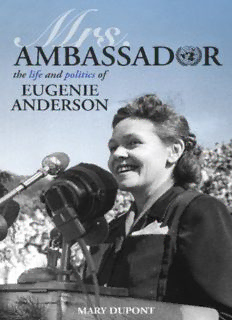
Mrs. Ambassador: The Life and Politics of Eugenie Anderson PDF
Preview Mrs. Ambassador: The Life and Politics of Eugenie Anderson
Mrs. AMBASSADOR Mrs. AMBASSADOR THE LIFE AND POLITICS OF Eugenie Anderson MARY DUPONT The publication of this book was supported though a generous grant from the Eugenie M. Anderson Women in Public Affairs Fund. Text copyright © 2019 by Mary Dupont. Other materials copyright © 2019 by the Minnesota Historical Society. All rights reserved. No part of this book may be used or reproduced in any manner whatsoever without written permission except in the case of brief quotations embodied in critical articles and reviews. For information, write to the Minnesota Historical Society Press, 345 Kellogg Blvd. W., St. Paul, MN 55102-1906. mnhspress.org The Minnesota Historical Society Press is a member of the Association of University Presses. Manufactured in the United States of America 10 9 8 7 6 5 4 3 2 1 The paper used in this publication meets the minimum requirements of the American National Standard for Information Sciences—Permanence for Printed Library Materials, ANSI Z39.48-1984. International Standard Book Number ISBN: 978-1-68134-127-9 (paper) ISBN: 978-1-68134-128-6 (e-book) Library of Congress Cataloging-in-Publication Data available upon request. This and other Minnesota Historical Society Press books are available from popular e-book vendors. CONTENTS Author’s Note Preface One LEAVING THE TOWER Two JOINING THE PARTY Three REPRESENTING AMERICA Four REACHING FOR WASHINGTON Five BREACHING THE IRON CURTAIN Six HOLDING THE LINE Seven PASSING THE STANDARD Afterword Acknowledgments Notes Bibliography Index Mrs. AMBASSADOR AUTHOR’S NOTE A LL BIOGRAPHIES START WITH THE SAME COMMITMENT: that the subject is worthy of our attention. From there, the writer has countless choices to consider and a thousand narrative paths to follow or abandon. No single biography can, or should, capture and relay every detail from the subject’s life; therefore, each biography becomes a story based on choices. I approached this biography of my grandmother knowing that I would be discarding almost all of my own memories and associations and relying, almost exclusively, on the words of others—most importantly, on Eugenie Anderson’s own firsthand words. I deliberately chose to incorporate hefty amounts of citations in Eugenie’s own voice, invoking her logic and her cadence, allowing the reader not only to experience her verbal and written words but also to note the omissions. I also made a conscious choice to favor many firsthand voices of Eugenie’s contemporaries as her story progressed: from early family letters; Minnesota historians (versus national authors); journalists in their lingo of the day; later reminiscences and personal letters by family members and political colleagues; and reflections by women about women in politics and society. In narrowing this biography to a discussion of Anderson’s place in mid-twentieth-century opportunities for women, specifically in diplomacy, as well as her personal life, I deliberately abandoned other narrative paths—paths I am confident are already or are yet to be covered in excellent fashion by other historians and political writers. Eugenie Anderson was my grandmother. I offer this portrait of one interpretation of her life based on an interweaving of private and public aspects that felt particularly compelling to me in our ever-changing political and social climate. PREFACE E UGENIE MOORE ANDERSON WAS A CONSTANT PRESENCE and an active influence on the American political scene in the mid-twentieth century. She achieved a historic diplomatic status when President Truman appointed her the first woman to the rank of Ambassador for the United States in 1949. Over the course of her career, international news and images of her engaged readers of thousands of papers across the country and the world, through her high-level appointments to postwar Denmark, Communist Bulgaria, and the United Nations. Until now, however, the story of her life, combined with her experience as a woman in politics, her involvement in the Minnesota DFL Party and the national Democratic Party, and the effect she had on the history of Minnesota and the country, has not been told. Walter Mondale says: “Eugenie was one of the giants of the DFL Party … a gifted, scholarly, kindly, totally aware person. Probably [Hubert] Humphrey’s best friend.”1 Eugenie was not in a position to ask if a woman could have it all; rather, she concerned herself with protecting the democratic system that would enable other women, and men, to pursue such questions. This biography of Minnesota’s Eugenie Anderson will explore not only how her life was influenced as a woman by the politics and expectations of her century but how she directly influenced twentieth-century politics and history. Jo Freeman, feminist author and civil rights activist whose work spans over fifty years, wrote, “It took the concentrated efforts of both insiders and outsiders to hoist women’s political participation beyond the level of tokenism.” Eugenie began, naturally, as an outsider. Friend, adviser, and campaigner for future vice president Hubert Humphrey, she launched her own career after meeting the women who were insiders: Eleanor Roosevelt and Democratic National Committee vice chairman India Edwards. It was through the combined sponsorship of Minnesota men like Humphrey and Governor Orville Freeman, and women with direct ties to the White House like Roosevelt and Edwards, that Eugenie burst into national view, seemingly from nowhere. Her own strategies for staying in the game proved just as valuable as sponsorship by others. Eugenie
